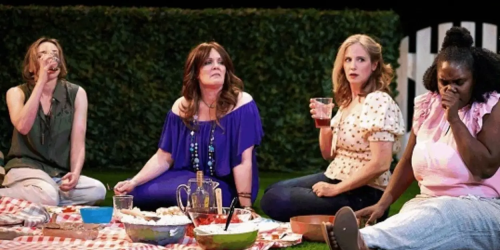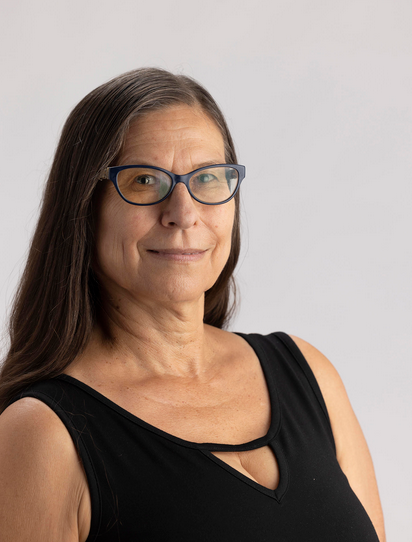
Since its founding in 2014 by Tracy Liz Miller and Brenda Jean Foley, The Bridge Initiative has been a consistent and ardent champion of diversity and community-building. As a women-led artistic collective, they have stayed true to their vision ~ “an equitable industry where women and other groups who have historically been denied access are equitably represented and valued.”It is in this context that their productions and initiatives are invaluable mirrors through which audiences can broaden their perspectives and sensitivities. Such is the case with their current production of Elaine Romero‘s LIKE HEAVEN, a buoyant little comedy in two acts whose arc revolves around acts of bonding, betrayal, and empowerment.

It’s a fitting marriage of theatre company and playwright as Romero’s vision aligns with that of The Bridge Initiative. In her own right, Romero has established herself as a compelling voice through which the complexities of social and cultural issues ~ social justice, cultural heritage and personal identity ~ are illuminated. For EVITA at American…In LIKE HEAVEN, Romero casts her focus on one woman’s quest for self-fulfillment.
April (Brenda Jean Foley) is at the crossroads of small-town life, stuck between the conflicting pressures of personal ambition, family obligation, and a less than fulfilling marriage to Jeff (the play’s never-present but ever-looming and consequential figure). Her bag is packed, and she would be off and on her way to a singing career were it not for the persuasive entreaties of her younger sister Callie to remain…at least, for a couple more weeks.
As April stows her suitcase and dispenses with her traveling togs, she settles back into her old routine, that is, until it’s picnic time on the front lawn of their pristine neatly landscaped home. April the dreamer and Callie, the embodiment of domestic tranquility, are joined by two diametrically different personalities ~ the true-to-Scripture Trudy and Sapphire, the flamboyant champion of license ~ for a repast that evolves into an explosive set of revelations.
One revelation in particular snowballs into a chain reaction of unsettling confessions. They all may have been drinking from the same tainted well. As they confront their inconvenient truths, the foursome commences to unveil their true selves and motivations, only to test the boundaries of unadulterated friendship and personal responsibility. The joy of the play is their convergence into a chorus of encouragement that spells permission for April to spring forward.
Foley’s April is a model of understandable unsteadiness and naivete until she finds her legs and steadies herself to set out on her long-delayed adventure.
Callie (portrayed with disarming affability and balance by Natalie Andrews) is a marked contrast to April’s mercurial nature. As the primary caretaker of the household and, so it appears, the tie that binds the family, she seemingly epitomizes balance and fidelity. There is something, however, in her mysterious Mona Lisa smile at the play’s end that may make one wonder about her true intentions and motivations.
Trudy (Shonda Royall) brings her avowed faith to the gathering ~ chastising improprieties, calling out hypocrisies, and proclaiming the Word. However, for Trudy, not all is as it seems. And therein lie the makings of a dramatic twist in the narrative for which no spoilers are allowed. Let’s just say that what happens by the nearby river stays by the river…or ought to. Royall is a fireball presence on stage, delivering a robust performance and providing a delightful comic edge to the proceedings.
The jewel in the mix is Sapphire (played to perfection by Maren Maclean). She is irreverent, flamboyant, and the manifestation of “the internal slut.” Her performance is as good as it gets from a distinguished veteran of the Phoenix stage, once described by the former Arizona Republic theatre critic Kyle Lawson (RIP) as having a tongue that “takes to screwball comedy like a cat to a canary” and that, “like some denizen of the ether,” “can charm you into believing that air is water and dross is golden.” Maclean fulfills that promise with panache. She is an ethereal and uninhibited force, the embodiment of indiscretion, and an inspiration to one who may wish to emulate her spirit of freedom.
Thanks to Romero’s craftsmanship as a writer, the play does not get weighed down by gravity but is instead buoyed with precisely drawn moments of humor. She has penned four very distinctive and relatable voices. Director Samantha Wyer Bello has steered the cast’s course with a steady and sensitive hand. The set design (credit to Tiana Torrihon-Wood) and lighting choices (Stacey Walston) contribute to the play’s overall atmosphere. And the ensemble of Andrews, Foley, Maclean, and Royall delivers praiseworthy performances, heightened by an onstage chemistry that is highly entertaining.
LIKE HEAVEN, co-produced by The Bridge Initiative and Estrella Mountain Community College, completes its run of six performances on May 13th.
The Bridge Initiative ~ https://bridgeinit.org/ ~ Tickets available at eventbrite.com.
Venue: Estrella Mountain Community College Fine Arts Center, 3000 North Dysart Road, Avondale, AZ
Photo credit to Rick Meinecke: L to R ~ Andrews, Maclean, Foley, Royall
The production runs through May 13th at Estrella Mountain Community College in Avondale, AZ.
Review by Herbert Paine for BroadwayWorld.







